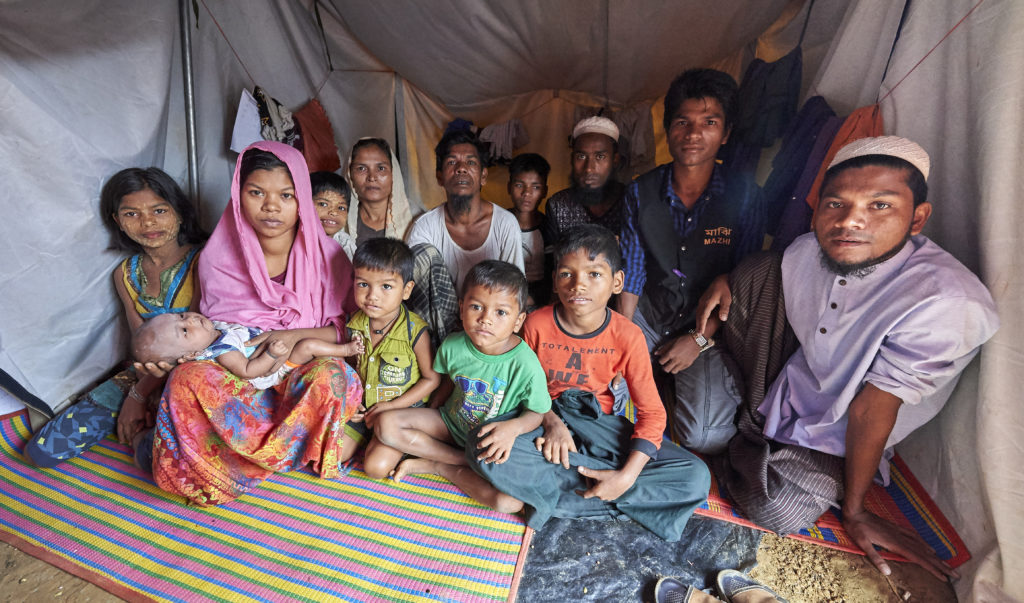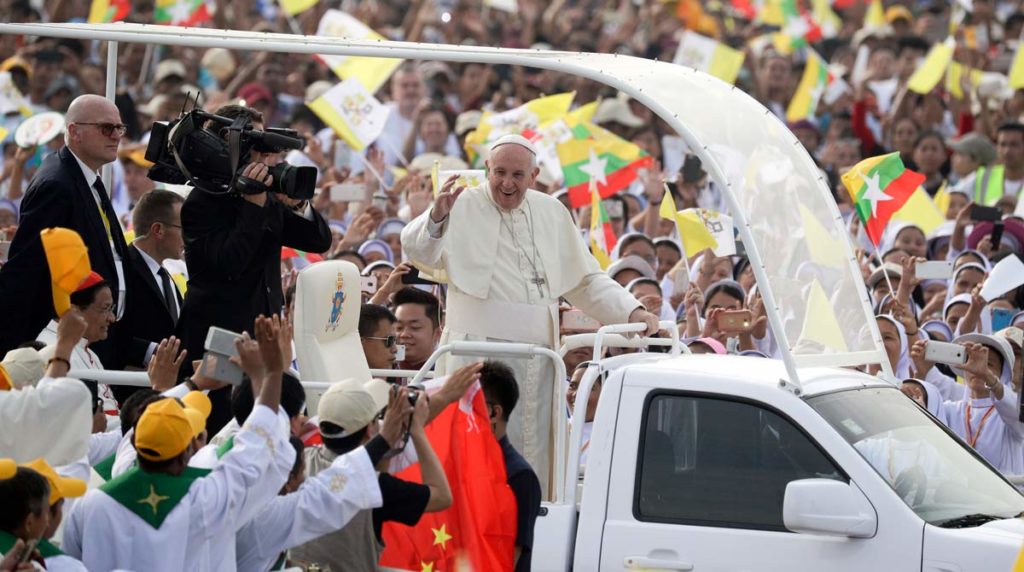Rohingya, a ‘forbidden’ word and people

This extended Rohingya family lives in a crowded makeshift shelter in the Chakmarkul Refugee Camp near Cox’s Bazar, Bangladesh. More than 600,000 Rohingya have fled government-sanctioned violence in Myanmar for safety in Bangladesh. PAUL JEFFREY
When I received a message from the United Methodist Women International Ministries that I would facilitate a human rights workshop in Kalaymyo, Myanmar, a province on the border of Chin State where Buddhism is not the majority religion, the first thing that came to my mind was that word.
It is a word I never said in Myanmar. I was warned not to say it even to Filipinos, or to Philippine Ambassador Red Kapunan in Myanmar, even to Christians and to a Burmese official of an international organization within the confine of his office. He said, it is not safe to mention even here.
When UN Secretary General Ban Ki Moon said it in 2014 during his visit to Nay Pyi Taw, he was rebuked.
Pope Francis did not say it either during his historic visit on November 27. Not until he reached Bangladesh.
“Rohingya.” That’s the forbidden word.
‘Forbidden’
I arrived in Yangon in the morning of October 15. It was the closing ceremony of the Diamond Jubilee Celebration of the Christian Conference of Asia (CCA). From the airport, I took a taxi to the venue of the event.
Along the highway, I saw faces, young and old alike, women and men, covered in thanaka (powder from thanaka bark used for cosmetic and medicinal purposes) and wearing longyi (sarong). They were chewing paan (betel nut preparation) and spat the red-blood juices anywhere.
Thousands of Christians from all over the world gathered at the capital to celebrate the ecumenical journey of Christian churches in Asia.
As the pastors, priests and ministers started their messages, I awaited mention of the word. Instead, an Indonesian pastor gave a message condemning the extrajudicial killing in the Philippines under the Duterte administration.
“The [Rohingya] issue is not just political, but more on religious issue. There is no unified stand from the Christians, especially here [Myanmar] out of fear of reprisal,” a deaconess claimed.
A member of a diplomatic community mentioned that the issue is complicated. He said that a few weeks after the conflict erupted between the ARSA (Arakan Rohingya Salvation Army) and the Myanmar security forces in Rakhine State on August 25, diplomats were invited to Rakhine State to validate Aung San SyuKyi and the Myanmar government’s claim that there were no human rights violations committed against Rohingyas.
“We cannot just ask questions. The military decides whom we speak with,” he said.
Friendless people
Described as “the most friendless people in the world,” the Rohingyas, who are Muslims, have been denied citizenship by the Burmese government, which declared them stateless in 1982.
Although Muslims have been living in Myanmar since the early 12th century, the Rohingyas arrived mainly as laborers during British rule from 1824-1948. They were from British India and Bangladesh. Burma (old name of Myanmar) was still a province of British India from 1885 to 1931. Myanmar only recognizes eight indigenous ethnicities: Bamar; Chin; Kachin; Kayin; Kayah; Mon; Rakhine and Shan. These are divided into 135 distinct ethnic groups. Rohingya is never included on the list.
Despite having diverse races and languages, the more than one million people who speak Rohingya or Ruaingga are not included in this “diversity.” They are the outsiders. They are called Bengali, a detested name but one that can be easily said.
Unnamed people
While we were discussing human rights among the Christian women from Mizo, Zomi and Burmese races in Kalaymyo, thousands were fleeing Rakhine State to Bangladesh. They have nothing except their will to survive and the desire to be recognized as citizens of Myanmar.
I was with Paul Jeffrey, a veteran United Methodist Church journalist and photographer, during this trip. He traveled to Cox’s Bazaar in Bangladesh after our training. At Cox’s Bazaar, he witnessed the plight of the Rohingyas.
“Bangladesh is overflowing. Although it perceives kinship, it really doesn’t want them. Burma’s trying to sell off northern Rakhine State to the Chinese, and one more uppity ethnic group is one too many. Fortunately, the Burmese elite, including Aung San Su Kyi, can appeal to the base instincts of their country folk like the racist belief that the Rohingyas are the “other.”
Paul commented that Rohingya women use thanaka on their faces, which is very common among the Burmese but not among the Bangladeshis.
The presence of God
Pope Francis is a known human rights defender and is unconventional compared with his predecessors. But he held his tongue while in Myanmar and during his meeting with Gen. Min Aung Hliang, the head of Tatmadaw (Burmese Military) at Yangon’s St. Mary’s Cathedral and later with Aung San Suu Kyi.
In his homily, he spoke of the Church’s role in the healing of Myanmar, proclaiming Gospel to different races (tribal minorities in his words) despite limited means, and respecting differences.
In Dhaka, where it was deemed safe, the Pope met with 16 Rohingya refugees and said: The presence of God is called Rohingya.
He asked forgiveness in the “name of all those who have persecuted and hurt them.” But he never named the oppressors.
Uncertainties
Pope Francis heeded the advice of the Myanmar Church not to say “Rohingya.” The Church feared for the thousands of Christians if the Pope slighted the Tatmadaw. Christians are not afraid of the Buddhists but of Buddhist nationalists and the military.
Pope is back in the Vatican. I have been back in Thailand for more than a month, safe in my comfort zones.
Meanwhile, Myanmar and Bangladesh signed a memorandum on the repatriation of the Rohingyas, but it remains unclear what awaits them back in Rakhine. Distrust prevails.
Back home I still keep the Mizo woman’s piece of paper where she wrote, human rights is about recognizing one’s race.








